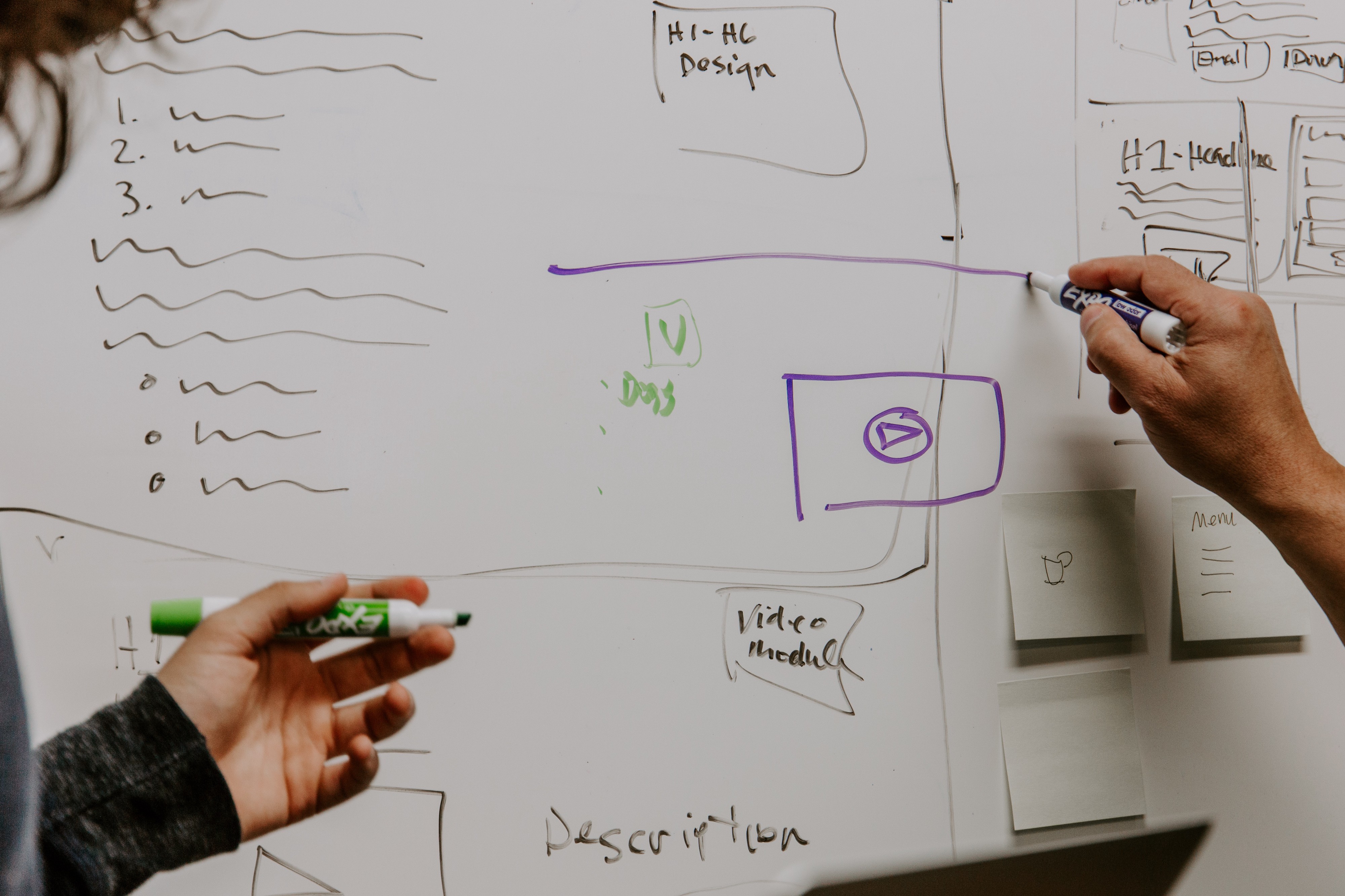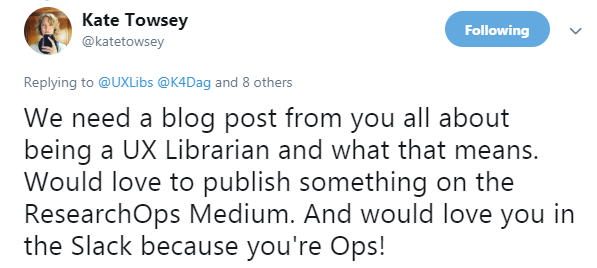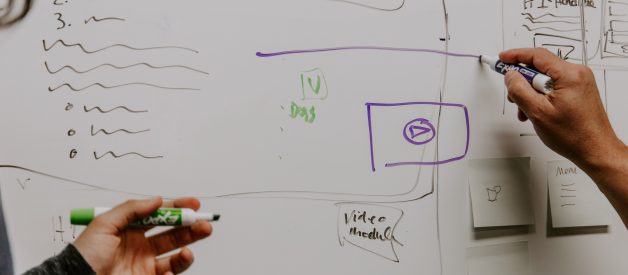 Photo by Kaleidico on Unsplash
Photo by Kaleidico on Unsplash
That?s a great question. Inquiring minds want to know:
 https://twitter.com/katetowsey/status/1029661846754619393
https://twitter.com/katetowsey/status/1029661846754619393
And so, here to help answer are two professionals at the intersection of UX and libraries: Kelly Dagan and Courtney Greene McDonald. The following are some of our thoughts!
what does ?UX Librarian? mean to you?
KD: I remember the first time I introduced myself as a ?UX librarian? to a group of people outside libraries.
They were designers and researchers from a plethora of companies, and they looked at me curiously.
?Wait, so you manage pattern libraries??
?Uh, no,? I explained, ?I do the same things you do, just in the context of an academic library.?
?Ohhhhh,? everyone chorused.
?I wish someone would manage my pattern library,? someone muttered, crestfallen.
User experience has permeated lots of fields, and libraries are no exception. I spend much of my time working on how to help distracted, stressed, anxious people accomplish the things they need to do in a day. To me, UX librarian means, ?librarian who works to ensure that our systems, spaces, services, and resources help people work in the best ways for them, by gathering evidence and creating compelling narratives and processes to drive change.?
CGM: I would describe a ?UX Librarian? as someone whose primary job responsibilities focus on observing and analyzing usage patterns, customer preferences, and emerging trends, then synthesizing that information into concrete recommendations for changes, improvements, and innovations in the provision of library services and resources, and in the design and features of library spaces and interfaces.
I would further add that a happy UX Librarian is likely to be someone who not only observes, analyzes and recommends, but also participates in implementing those data- or standards-driven changes, improvements and innovations.
what kinds of things do you do?
KD: I work on understanding how people engage with scholarly communication, or write research papers, or prepare presentations, or build portfolios, etc., in order to help our services become more visible, accessible, usable, and valuable to them.
As for my concrete work tasks, here?s a quick laundry list of a few:
- Planning and running usability tests
- Mapping user flows through tasks and platforms
- Reviewing analytics for traffic patterns, bounces, paths
- Designing exploratory research to uncover user mental models
- Facilitating contextual interviews with users
- Analyzing research results for insights and requirements
- Iterating design solutions and developing prototypes
CGM : This question is a little tougher for me to answer than it would have been about three months ago, as I just moved cross-country and stepped into a newly-created position in a different organization! As with any brand new position, it?s exciting to have an opportunity to shape the roles and responsibilities, but it?s also something that takes a little time.
With that in mind, it might make most sense to answer in light of my previous position, as Head of Discovery & User Experience (DUX) at Indiana University Bloomington Libraries. DUX is responsible for the Libraries? Drupal-powered website, the shared statewide online catalog interface, and a raft of other initiatives and projects, including strong contributions to the Libraries? social media. So, a good bit of my work did focus on technology-type channels, but I always saw the technical angles as a means to an end. Practically speaking, some UX activities that were part of my day-to-day:
- write (and re-write, and re-write again!) all types of content to be clear, concise, and accessible, both in tone and in the more technical senses of that term;
- identify areas in which we needed input from end-users and data about their behaviors and preferences, and then work with my team to design ways we could learn what we needed to know (for examples, see Kelly?s answer to the previous question);
- collaborate with software developers to translate ideas into ?requirements? and then check and re-check as those requirements were transformed into features;
- provide project management support to colleagues, to help them move through that same process of moving from idea to feature;
- and work directly with our students, faculty and staff at the reference desk and in other venues.
Reading these over, the themes that stand out to me are communication, ideas, and support.
what?s the best part of your job?
KD: I got into librarianship because of the service orientation, so helping people achieve at all levels (from ?get the thing? to ?complete the thesis?) is really important to me. Along with that, I get a lot of personal enjoyment out of discovering the myriad ways that people frame things and work through them ? most of the time, these are ways I?ve never even considered. Talking through and watching someone?s process allows me to totally geek out about the nature of human cognition and creativity, while also giving me a strong shot of empathy and humility. As system experts, we learn to be at ease with a certain type of complexity, and it?s helpful to get continual reminders from other perspectives as we strive to be more accessible and inclusive.
CGM: Literally any action that eliminates unnecessary complication. While everything I do may not create spontaneous delight, per se (does anyone else care about the -0 on the end of URLs?), there are a lot of things I might be able to do that would remove obstacles to delight ? and not being able to find the place where you can complete your immediate task when you have many things on your to-do list is not delightful.
As educators and information professionals, yes, our environment and our work are inherently complex ? but complexity and complication don?t always have to go hand-in-hand. Also, as a part of a large ecosystem with many participants, inputs and outputs, sometimes ?finished? can seem like an insurmountable goal. I like to focus on celebrating any and all victories, however big or small. Fixing a typo, going from three buttons to two, piloting a new project, writing a clearer piece of signage, taking time to listen and ask until I truly understand the priorities and viewpoints of my colleagues or constituents, helping a student put their hands on that one article they really needed for today ? or, shoot, tidying up the shared office space! All of these things can be and have been the best part of my job on any given day.
what?s the worst part of your job?
KD : As Courtney points out, there is so much work that could get done at any given time that it can seem like an ocean of endless troubles (I love her strategies for staying sane!). It?s really tough when you come up against a problem where, due to system ownership, staffing, or other factors, there just isn?t the capacity to make a change. So much of this work relies on partnerships and trust, and part of that means negotiating different priority structures?which gets even more complicated when you start talking about external vendors (who have a large customer base and may not share your UX values).
I constantly have to be mindful of not losing trust by starting investigations or investing time in areas where I already know change is unlikely due to more structural factors ? but you can often get into tricky chicken-and-egg situations here. I try my best to make the evidence ?speak,? so that it isn?t perceived as just coming from me, and get clarity on my colleagues? contexts in order to show how they have agency for change.
CGM : The worst part of any UX work is the part where you know that something is broken, cumbersome, creating unproductive friction, etc., and you are unable to even begin to investigate or address the underlying issues ? whether that?s due to the limitations of the interface, physical space, or resource constraints, or whether it?s due to a lack of agreement with colleagues within the organization about the scope, severity and priority of the problem.
Saying this relies on the fact that the problem is a real problem and not just a matter of my own personal preference or style. Sometimes it can be difficult to communicate to colleagues that part of the job for the UX Librarian (or UX department) is to prioritize the interests of the end-users and relinquish the pursuit of their own preferences. (Yes, I do have opinions about fonts, and where chairs should go, and how buttons should look. That said, the decisions we as an organization make about these issues must be driven by our students? preferences, not my own.) In my experience, earning people?s trust in your motivations and judgment is something you establish over time through consistent decision-making based on, again, data and standards.
what?s one myth or misconception about your job that you?d like to bust?
KD: That it?s just about ?caring about the patron? ? most people I?ve met in librarianship care, and care deeply, about their patrons. Library UX involves a set of practices and processes that help to generate evidence for impactful change, and as Courtney mentioned earlier, it also includes methods for actually implementing that change (design thinking and UX are very happy bedfellows).
It?s also not meant to be an exclusive club, as UX benefits grow exponentially the more people are involved. These practices and processes can be very accessible (check out Courtney?s excellent Putting the User First and Rocket Surgery Made Easy by Steve Krug). People can be involved at a variety of levels, across your library, and the diversity of perspectives is always a plus.
CGM: You?ll notice I didn?t use the word technology in my initial answer ? while a lot of library work relies on various technologies or technology stacks, and while a lot of library UX conversations involve technology, my strong feeling is that the key focus of user experience must be people and their individual experiences, whether those are with technology, physical spaces, library staff, or (more usually) a mix of all those components.
I completely agree with Kelly ? librarianship tends to draw people who are interested in learning, interested in other people, and interested in helping people, and there are so many opportunities to participate in this type of work in libraries. It?s always a wonderful feeling to be able to work with colleagues who are interested in dipping a toe into UX projects or initiatives, regardless of whether it?s explicitly part of their job duties.
We?d love to hear thoughts from other UXers and librarians ? and if you liked this article, let us know!


